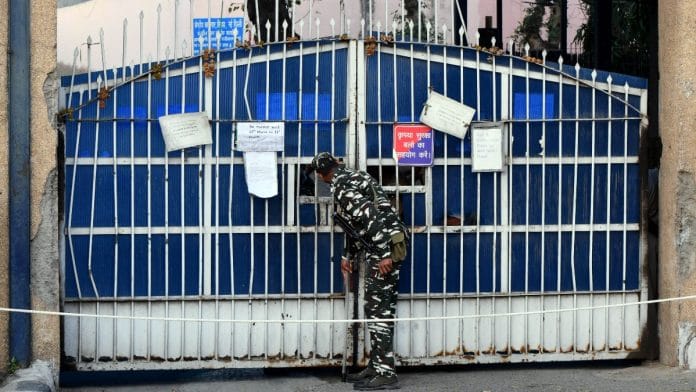New Delhi: The Parliamentary Standing Committee on Home Affairs has recommended that Global Positioning System-enabled tracking devices be used to monitor the whereabouts of prisoners who have obtained bail, it said in a report released Thursday.
The recommendation was one of several aimed at combating prison overcrowding, with the committee noting that jails were already well beyond capacity at 130 percent occupancy — the bulk made up of individuals still under trial for their alleged offences.
The 245th report on prison reforms said the committee “is of the view that technology can be explored to produce cost-effective bracelet or anklet tracker that can be worn by the prisoners who have procured bail and are out of prison on bail”.
It further noted the three most common counts under which bail is denied include apprehensions that the prisoner on bail might try to leave the country, commit another crime, or influence witnesses.
The committee’s recommendations come in light of the Odisha government’s plan to use GPS tracking devices to keep track of undertrials facing non-heinous charges. This is expected to enable them to stay at home instead of being lodged behind bars.
India’s prisons, the NCRB’s Prison Statistics India 2021 report noted, are overcrowded, with occupancy rate at 130 percent. The 245th report on prison reforms added that the number of undertrials in prisons is far more than convicts, even as jails remain understaffed.
The committee, however, added in the report that this technology to track UTPs (under trial prisoners) must be put to use while ensuring no violation of “human rights or the method should be used on a voluntary basis after procuring the consent of inmates”.
The use of tracking devices for convicts on parole was also part of the new provisions introduced by the government through the Model Prisons Act, 2023. The act was proposed in the wake of killings inside some of the country’s most highly-guarded prisons, including the cold-blooded killing of Tillu Tajpuriya by rival gang members inside Tihar.
The committee in its report also noted that transgender inmates are often subjected to misrepresentation in prisons and not provided proper care, even if kept separately. It further recommended the need for separate washroom facilities for transgender inmates.
“While they may house prisoners separately but the toilets and shower facilities for all must be common which defeats the whole purpose as transgender inmates could be subjected to cruelty and sexual violence in such vulnerable and common areas. Therefore, the privacy and dignity of transgender inmates are ultimately being violated in one way or another,” read the report.
As for “young offenders”, the committee noted that the manner in which they are dealt with procedurally remains unclear, and that not all states and Union territories have Borstal schools — reformation centres for juveniles.
“Committee recommends that a clear definition of ‘young offenders’ should be given by MHA along with a common guideline to all State/UT. Governments describing the procedure to govern them shall be provided for the convenience of the State/UT Governments,” the report said.
Among other recommendations, the committee also suggested that all vacant posts in prisons should be filled up within three months to decrease the workload, including that of the post of welfare officers.
Further, the committee suggested that “strict penalties and disciplinary measures” be included in the conditions of service of jail staff to avoid their associations with inmates for the purpose of pulling favours or infiltrating contraband and mobile phones.
The report also recommended that to reduce the problem of overcrowding in prisons, inmates should be transferred to vacant cells within the state or other states.
(Edited by Amrtansh Arora)






